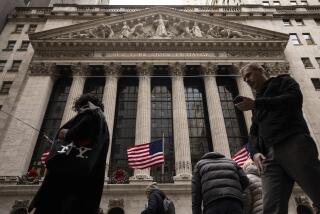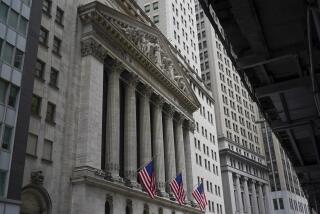After a two-year rebound, recession risks rise
The U.S. economy has officially been out of recession for two years, but fear of falling back into the abyss has dogged the recovery every step of the way.
Now, the prospect of recession no longer is a fringe view.
“Recession is not inevitable, but I think there’s better than a 50-50 chance now,” said Bill Gross, the respected investment chief at bond fund giant Pimco in Newport Beach.
Stock markets worldwide have been ringing warning bells since late July, as share prices have plunged in the steepest pullback since the 2008 financial-system crash. The Dow Jones index sank nearly 600 points combined on Thursday and Friday and slumped 4% for the week, its fourth straight weekly decline.
Millions of Americans can argue that stocks are just coming to understand the true level of misery in much of the economy even as the recovery has progressed.
Still, by the standard measure of growth — gross domestic product, or the total value of goods and services the economy produces — the U.S. has been rebounding since the third quarter of 2009, after the deep recession that began late in 2007.
Even as growth slowed in the first half of this year, analysts were quick to blame the deceleration on what they believed would be temporary factors: auto-plant shutdowns after Japan’s devastating earthquake in March, for example, and the spike in oil prices amid widespread social unrest in the Middle East and North Africa.
The almost universal belief was that global growth would accelerate in the second half of the year. But that view has been fading fast this summer.
“We’re seeing a pattern of data that look very similar to what you see at a turning point in the economy,” said Michael Darda, chief economist at MKM Partners in Stamford, Conn. And he doesn’t mean a turning point to better times.
A key measure of U.S. consumer confidence has crashed to a 30-year low. Stock market volatility has become gut-wrenching. And prospects in the manufacturing sector, one of the few true bright spots of the recovery, have dimmed markedly.
Other data, however, have been more upbeat, including retail sales in July, which showed that consumers haven’t yet slammed their wallets shut.
Until recently, many analysts assumed that this summer would be a replay of last summer. Then, as now, the U.S. economy was slowing and Europe’s government-debt crisis was worsening. But both situations improved by late summer, and optimism about global growth surged in the fourth quarter of 2010.
“Everyone wants to believe it’s 2010 again. But it’s not,” Darda says.
For one, the U.S. economy had been much stronger in the first half of last year, providing a stronger base. Real GDP rose at an annualized rate of 3.9% in the first quarter of 2010 and 3.8% in the second quarter.
This year, first-half growth was shockingly dismal. GDP rose at a mere 0.4% rate in the first quarter and 1.3% in the second.
In Europe, the concern a year ago was that Ireland and Portugal, two relatively small economies, would follow Greece in needing bailouts from the rest of the euro-zone countries. This time, doubts about governments’ ability to finance their debts have spread to the far larger economies of Spain, Italy and even France.
In an echo of the 2008 banking-system crisis, rumors of financial troubles at major French banks have rocked global markets in the last two weeks.
Prone to alternating bouts of glee and gloom, the stock markets’ historical ability to call economic turns has been checkered at best. Even so, the severity of the losses this year in European markets has further undercut those struggling economies.
Italy’s main market index plunged to a two-year low Friday and has tumbled 37% since peaking in February. The French market has dived 27% from its 2011 high.
By contrast, U.S. blue-chip stocks’ declines have been more moderate. The Dow is down almost 16% from its 2011 high reached in April.
Stocks also were slumping a year ago. But market bulls believed that the economy could be jump-started by another infusion of money by the Federal Reserve.
When Fed officials met at an annual economic conference in Jackson Hole, Wyo., at the end of August 2010, Chairman Ben S. Bernanke gave the markets what they wanted. He signaled the Fed’s willingness to begin buying massive amounts of U.S. Treasury bonds from banks and other investors, in an effort to pump cash into the financial system.
Although the Fed didn’t launch those purchases until November, stocks began to rocket in early September, anticipating more help for the economy. Worries about a double-dip recession nearly evaporated.
Next week, Bernanke and his Fed peers will again gather in Jackson Hole. And once again, Wall Street is desperate to hear some encouraging words as markets sink and the economic landscape becomes more treacherous.
But there also is a foreboding sense that the Fed, and other government and central bank policymakers in the developed world, have run out of tools or willpower — or both — to buttress the faltering economy.
“Everybody is either conflicted or out of ammunition,” said Pimco’s Gross.
The Fed could undertake a new bond-buying plan, but Bernanke has endured heavy criticism for the last program. The Fed spent $600 billion on bonds from November to June, yet economic growth still was barely positive in the first half.
At its midsummer meeting earlier this month the Fed tried another tack, saying it expected to hold short-term interest rates near zero for the next two years to underpin economic growth. But that failed to give the stock market a lasting lift.
What’s more, Bernanke is facing internal dissent: Three of the 10 members of the Fed’s policymaking committee voted against the pledge on rates. Their concern is that by keeping rates at rock bottom the Fed could further devalue the dollar and set the scene for explosive inflation in the long run.
Bernanke also is facing external dissent of a different type. This week, Texas Gov. Rick Perry, who’s running for the GOP presidential nomination, made a controversial comment that appeared to encourage bodily harm to Bernanke if he continued to “print money.”
Meanwhile, President Obama is promising to introduce a new job-creation plan in September. But he faces an uphill battle, with Republican leaders intent on pressing for deep budget cuts.
Of course, whether GDP growth contracts or is just slightly positive may feel exactly the same to many Americans, particularly the jobless, and to the country’s countless struggling small businesses.
The danger is that, if another recession becomes official, it could feed on itself as consumers and businesses that might otherwise have spent money decide not to, opting instead to hoard more cash.
“It can be a self-fulfilling phenomenon when households and businesses just stop in their tracks,” Darda said.






